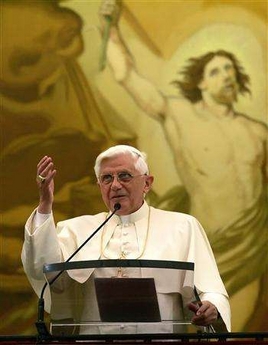 By Anne Applebaum , Already, angry Palestinian militants have assaulted seven West Bank and Gaza churches, destroying two of them. In Somalia, gunmen shot dead an elderly Italian nun. Radical clerics from Qatar to Qom have called, variously, for a "day of anger" or for worshipers to "hunt down" the pope and his followers. From Turkey to Malaysia, Muslim politicians have condemned the pope and called his apology "insufficient." And all of this because Benedict XVI, speaking at the University of Regensburg, quoted a Byzantine emperor who, more than 600 years ago, called Islam a faith "spread by the sword." We’ve been here before, of course. Similar protests were sparked last winter by cartoon portrayals of Muhammad in the Danish press. Similar apologies resulted, though Benedict’s is more surprising than those of the Danish government. No one, apparently, can remember any pope, not even the media-friendly John Paul II, apologizing for anything in such specific terms: not for the Inquisition, not for the persecution of Galileo and certainly not for a single comment made to an academic audience in an unimportant German city.
By Anne Applebaum , Already, angry Palestinian militants have assaulted seven West Bank and Gaza churches, destroying two of them. In Somalia, gunmen shot dead an elderly Italian nun. Radical clerics from Qatar to Qom have called, variously, for a "day of anger" or for worshipers to "hunt down" the pope and his followers. From Turkey to Malaysia, Muslim politicians have condemned the pope and called his apology "insufficient." And all of this because Benedict XVI, speaking at the University of Regensburg, quoted a Byzantine emperor who, more than 600 years ago, called Islam a faith "spread by the sword." We’ve been here before, of course. Similar protests were sparked last winter by cartoon portrayals of Muhammad in the Danish press. Similar apologies resulted, though Benedict’s is more surprising than those of the Danish government. No one, apparently, can remember any pope, not even the media-friendly John Paul II, apologizing for anything in such specific terms: not for the Inquisition, not for the persecution of Galileo and certainly not for a single comment made to an academic audience in an unimportant German city.But Western reactions to Muslim "days of anger" have followed a familiar pattern, too. Last winter, some Western newspapers defended their Danish colleagues, even going so far as to reprint the cartoons — but others, including the Vatican, attacked the Danes for giving offense. Some leading Catholics have now defended the pope — but others, no doubt including some Danes, have complained that his statement should have been better vetted, or never given at all. This isn’t surprising: By definition, the West is not monolithic. Left-leaning journalists don’t identify with right-leaning colleagues (or right-leaning Catholic colleagues), and vice versa. Not all Christians, let alone all Catholics — even all German Catholics — identify with the pope either, and certainly they don’t want to defend his every scholarly quotation.
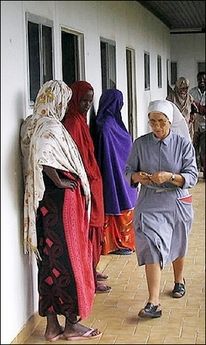 ASSOCIATED PRESS, NAIROBI, Kenya
ASSOCIATED PRESS, NAIROBI, Kenya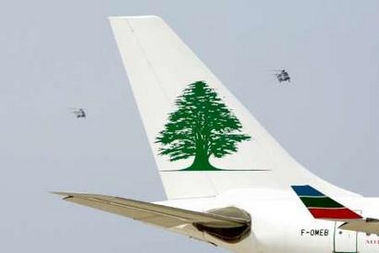 One week before I left for Beirut, my family had dinner with my uncle who was visiting from Beersheva, Israel. Halfway through the evening, he turned to look at me. He put down his fork.
One week before I left for Beirut, my family had dinner with my uncle who was visiting from Beersheva, Israel. Halfway through the evening, he turned to look at me. He put down his fork. 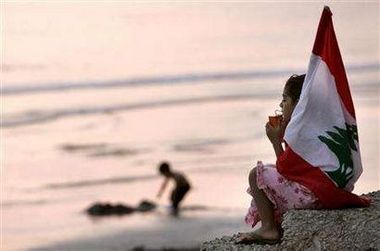 By Jonathan WrightReuters, BEIRUT (Reuters) – Abu Abbas, a car dealer from south Lebanon, has ready answers to the litmus-test question which has traditionally split his country down the middle — whether it should opt out of the Arab-Israeli conflict. Lebanon is an inseparable part of the Arab world, he says, and conflict with Israel is inevitable as long as any Arab land remains under Israeli occupation or Israel even exists.When I see Palestinians in Gaza and the West Bank suffering every day, the victims of racism and destruction, I consider that to be an attack on all humanity," said the 30-year-old bachelor, who supports the Shi’ite Muslim movement Hizbollah.
By Jonathan WrightReuters, BEIRUT (Reuters) – Abu Abbas, a car dealer from south Lebanon, has ready answers to the litmus-test question which has traditionally split his country down the middle — whether it should opt out of the Arab-Israeli conflict. Lebanon is an inseparable part of the Arab world, he says, and conflict with Israel is inevitable as long as any Arab land remains under Israeli occupation or Israel even exists.When I see Palestinians in Gaza and the West Bank suffering every day, the victims of racism and destruction, I consider that to be an attack on all humanity," said the 30-year-old bachelor, who supports the Shi’ite Muslim movement Hizbollah. 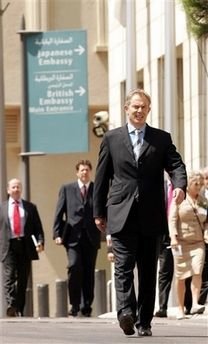 By Mark Deen, Sept. 11 (Bloomberg) — Prime Minister Tony Blair drew protesters in Beirut as he met with his Lebanese counterpart Fouad Siniora after refusing to condemn Israel’s bombardment of the country. “Given the events of the past few months, it would be surprising if there weren’t demonstrations,” Blair’s spokesman Tom Kelly said today.
By Mark Deen, Sept. 11 (Bloomberg) — Prime Minister Tony Blair drew protesters in Beirut as he met with his Lebanese counterpart Fouad Siniora after refusing to condemn Israel’s bombardment of the country. “Given the events of the past few months, it would be surprising if there weren’t demonstrations,” Blair’s spokesman Tom Kelly said today. 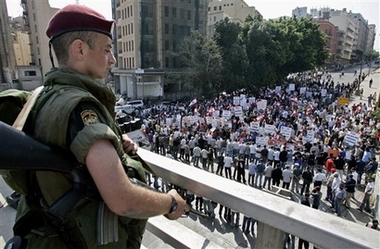 BIKFAYA, Lebanon By Edward Cody
BIKFAYA, Lebanon By Edward Cody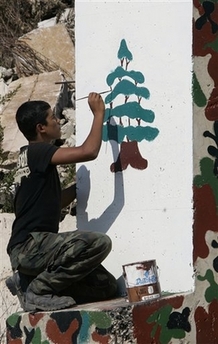 CAIRO (Reuters) – Lebanon said on Wednesday two Israeli soldiers captured by Hizbollah would not be released unless Israel was prepared to discuss a prisoner swap. The unconditional release of the soldiers, whose seizure by the Lebanese Hizbollah guerrilla group in a cross-border raid on July 12 sparked a 34-day war, is called for in the preamble to a UN security council resolution that brought about a ceasefire.
CAIRO (Reuters) – Lebanon said on Wednesday two Israeli soldiers captured by Hizbollah would not be released unless Israel was prepared to discuss a prisoner swap. The unconditional release of the soldiers, whose seizure by the Lebanese Hizbollah guerrilla group in a cross-border raid on July 12 sparked a 34-day war, is called for in the preamble to a UN security council resolution that brought about a ceasefire.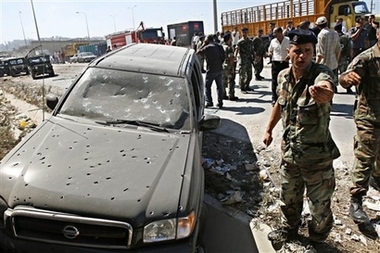 A remote-controlled bomb on Tuesday wounded a senior police intelligence officer who played a key role in the investigation into the assassination of the former Lebanese prime minister Rafik Hariri. Security officials said four of the officer’s aides and bodyguards were killed and five others wounded in a sophisticated attack in south Lebanon. Lieutenant Colonel Samir Shehade, deputy chief of the intelligence department in Lebanon’s national police force, was taken to a hospital in the southern port city of Sidon. His condition was stable, hospital officials said.
A remote-controlled bomb on Tuesday wounded a senior police intelligence officer who played a key role in the investigation into the assassination of the former Lebanese prime minister Rafik Hariri. Security officials said four of the officer’s aides and bodyguards were killed and five others wounded in a sophisticated attack in south Lebanon. Lieutenant Colonel Samir Shehade, deputy chief of the intelligence department in Lebanon’s national police force, was taken to a hospital in the southern port city of Sidon. His condition was stable, hospital officials said. 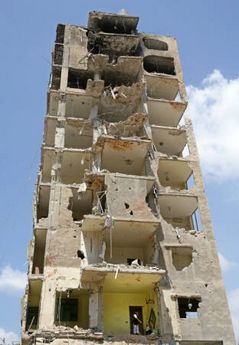 Israel agreed to lift its air and sea blockade on Lebanon on Thursday at 6 pm local time (1500 GMT) Thursday, a government statement announced. The decision came after guarantees from the United Nations and the United States that international troops would take up positions at the sea and air port in Beirut.
Israel agreed to lift its air and sea blockade on Lebanon on Thursday at 6 pm local time (1500 GMT) Thursday, a government statement announced. The decision came after guarantees from the United Nations and the United States that international troops would take up positions at the sea and air port in Beirut. 


